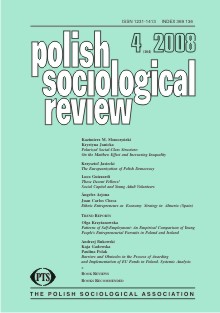Polarized Social-Class Structure: On the Matthew Effect and Increasing Inequality
Polarized Social-Class Structure: On the Matthew Effect and Increasing Inequality
Author(s): Krystyna Janicka, Kazimierz M. SłomczyńskiSubject(s): Social Sciences
Published by: Polskie Towarzystwo Socjologiczne
Keywords: Matthew effect; distribution of income; class structure; Polish society; Polish Panel Survey (POLPAN)
Summary/Abstract: The Matthew effect, considered in the broad context of a whole society, implies that increasing social inequality results from the accumulation of advantages provided by wealth and by the amassing of disadvantages associated with poverty. We formulate a hypothesis according to which the Matthew effect manifests itself in the polarization of opposite social classes even if the adaptive abilities of people belonging to different classes are controlled. The test of this hypothesis is primarily based on data drawn from the Polish Panel Survey (POLPAN), a survey in which respondents from a national sample were interviewed in 1988, 1993, 1998, and 2003. Additional data were obtained from surveys conducted in 1978 and 2006. All these data show that (a) during the last decade of the communist regime in Poland, the level of income inequality was relatively low and stable; (b) the change in the class structure occurring between 1989 and 1993 resulted in the rapid growth of social inequality, and (c) inequality increased up to 2006. The hypothesis stating that income inequality is rooted in the class structure, independently of people's adaptive abilities, is fully supported. Theoretical and practical implications of results supporting our hypothesis are also discussed.
Journal: Polish Sociological Review
- Issue Year: 164/2008
- Issue No: 4
- Page Range: 341-357
- Page Count: 16
- Language: English

